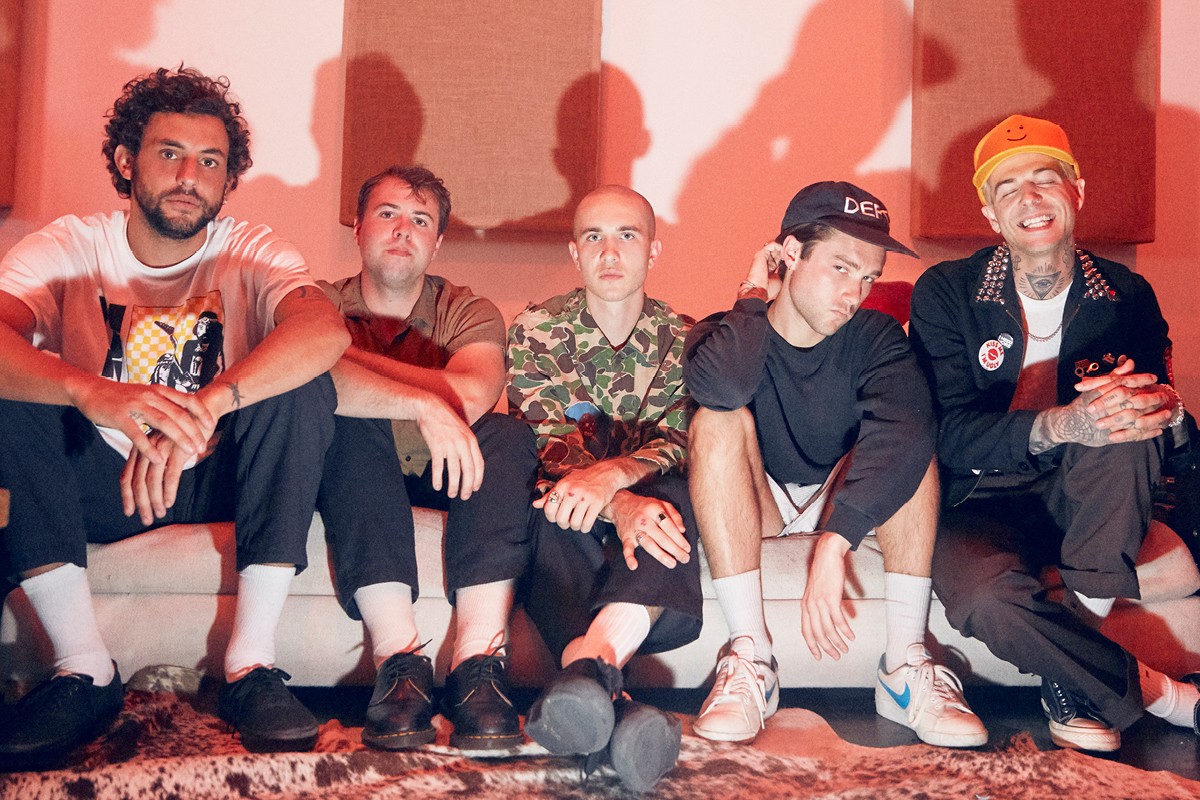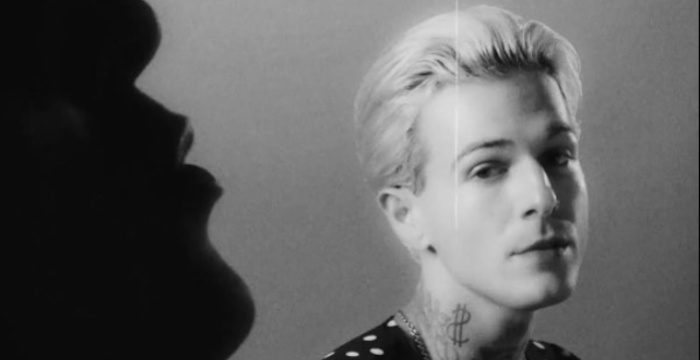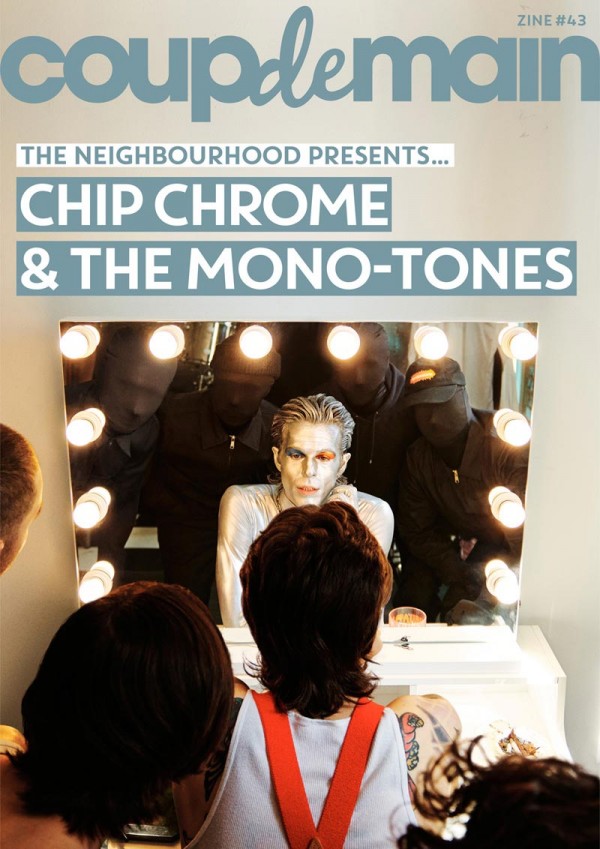Interview: The Neighbourhood on their ‘Hard To Imagine The Neighbourhood Ever Changing’ project.
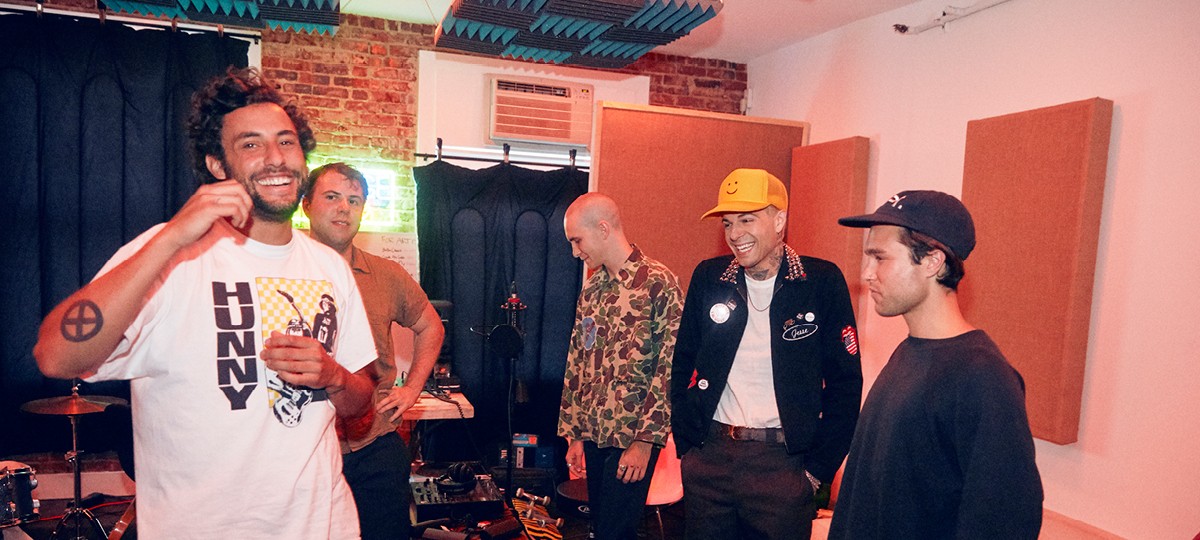
The Neighbourhood have a lot to say - whether they’re arguing with each other over which studio The Beach Boys recorded in in Los Angeles, or reminiscing on a signing that took place in an Adidas store in Russia (the band’s Brandon Fried still has his shoes, FYI), or about releasing one album and three EPs in the span of a year.
Made up now of Brandon Alexander Fried, Jesse Rutherford, Jeremy Freedman, Mikey Margott, and Zach Abels, the five-piece have been making music both together and separately for most of their lives - and having released their fourth album (a self-titled release) earlier this year, they are forging their own musical identity, with each release a new and unpredictable aural experience.
Ahead of the release of their brand new ‘Ever Changing’ EP, we caught up with The Neighbourhood in Los Angeles to ponder changes in the music industry, their musical process, and more…
...If you focus hard enough, and you want to do it in today’s world, and you are good enough, the world will let you know.

COUP DE MAIN: What was it about this latest album that made you want it to be the self-titled ‘The Neighbourhood’ album? Was it so you could form ‘Hard To Imagine The Neighbourhood Ever Changing’ when joining together all the titles of your latest releases? How did you come up with that?
THE NEIGHBOURHOOD - ZACH ABELS: Yeah, pretty much. It was one meeting we had with our manager, and reflecting on how music is currently going in the world and how it’s being perceived by fans. Nowadays, people have very short attention spans, so we wanted to think of a way we could release multiple projects to sustain their attention for a duration of time.
CDM: Is there one song on ‘The Neighbourhood’ that you feel is the best representation of where the band is in 2018?
THE NEIGHBOURHOOD - JESSE RUTHERFORD: No, probably not. But this whole project, and all of the projects, ‘Hard’, ‘To Imagine’, ‘The Neighbourhood’, ‘Ever Changing’, it was a big learning experience, because we just went into it. The last album we did was a sucky experience. This one, we all wanted to have a good time doing it and try to make it work, and we did, we succeeded in that. I feel like now we’re at a point where--
THE NEIGHBOURHOOD - BRANDON FRIED: That was probably more important than the actual music.
JESSE: It was. We were a bit all over the place. There were definitely some reviews which said, ‘There’s no identity,’ and I paid attention to them, and I could agree in a lot of ways. But that’s because we’ve never really had one, we’ve just done what we wanted to do this whole time.
CDM: I feel like a multi-dimensional identity is more interesting.
JESSE: Yeah, and it takes a while.
BRANDON: We’re all still pretty young too, so I feel like even if we had our sound already locked in, it’d be kind of boring from here on out. Like, ‘Alright, this is it.’ I’m sure even if we find our sound, we’re the type of dudes who no matter what, we’ll always try new shit. I feel like we all have such short attention spans, we get tired of something really quickly and want to try something else.
CDM: You don’t want everyone to have an expectation of what the next The Neighbourhood project will sound like.
BRANDON: If I was a fan, I would never really know what to expect next, because we do come out left-field with a lot of different stuff, which I think is more exciting too, instead of guessing what our next thing is going to sound like.
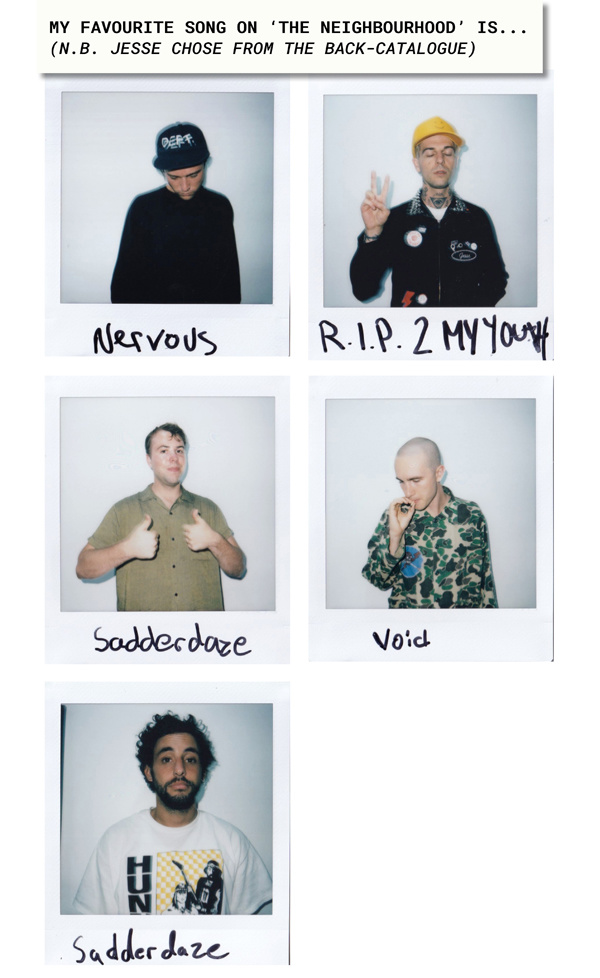
CDM: Do you have a release date for the ‘Ever Changing’ EP yet?
JESSE: Any day now. I was here until 3am last night, finishing everything up. The project is done, and we’ve had the songs for a minute - it’s just little arrangement tweaks.
THE NEIGHBOURHOOD - MIKEY MARGOTT: I just realised it’s your birthday in two days, Jesse.
BRANDON: 27, this is the one. If you can make it through this kid…
JESSE: I’m almost there. I’m ready for the after-life, I’m ready to shed the skin.
CDM: It’s a really clever idea for a project to have a slew of releases like you have had over the past 12 months. Why do you think it’s important for artists to keep their fans and listeners engaged? Especially in a time where people are more and more fickle with their listening habits.
ZACH: To keep things exciting. If everybody came out with an album the same exact way... No wonder people are getting over it.
MIKEY: With streaming and technology, and social media, everything is moving at a pace that no one has ever experienced before, which I think is throwing everyone. You kind of just have to decide in the moment what is best, because yesterday’s decision is already old news. If you’re going to do something based on what you thought you should do a month ago, then it’s already kind of living in the past. It’s changing that fast.
BRANDON: It’s ever-changing. <laughs>
CDM: Whereas previously, artists and labels would have a 12-month plan of an album roll-out.
BRANDON: And some established bands can still do that, like Radiohead.
JESSE: It depends on the artist you are.
BRANDON: Tame Impala can take two years to make one record.
JESSE: And they’ll be fine no matter what.
BRANDON: Even, Unknown Mortal Orchestra. I feel like indie bands can really take their time to make a perfect album.
ZACH: We were talking about it yesterday, but Tame Impala really did some shit that no other band has done. One, they didn’t go the radio route at all, but they have the same amount of success as a band like Arctic Monkeys.
BRANDON: ‘Elephant’ was kind of big though. That was the definitely the song that broke on alt-radio, I heard that song on KROQ.
ZACH: I feel like their last record really took them to that next step though, almost as more accessible.
JESSE: Bottom-line, it’s all quality with them. If you focus hard enough, and you want to do it in today’s world, and you are good enough, the world will let you know. I could honestly say, at least where my head had always been with this band, I’ve always been concerned about quality the least, because I was so busy trying to think of all the other parts of the puzzle. I think I was a bit lazy on that, and I didn’t realise it, but something has been clicking lately, especially after this last record came out, how we’ve been on the road and jammed and shit, it feels like if you make really good shit, the rest will come really easy. Not to say that we think we were making shit that was like, ‘Eh, whatever,’ but there’s a difference between putting out music, be it a song or a record, and feeling a certain way. You can feel different ways about it. Sometimes you don’t feel as strong. But it’s our job, we’ve got to do it. Like Brandon was saying, I guess where we’ve already gotten ourselves, we’re young and we got this big old opportunity and we were just playing for the past few years, like, ‘I like this, you like this,’ and trying to make it work.
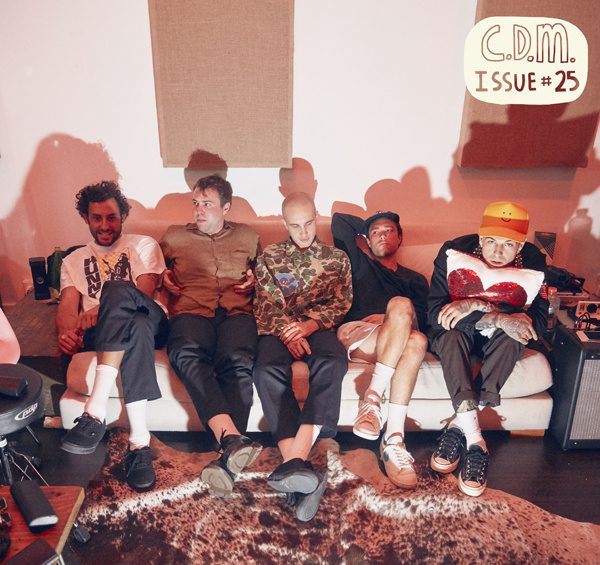
CDM: You’ve been a band now for seven years. What do you think have been the biggest changes in the music industry?
JESSE: Cultural shifts and who holds more importance - especially in America, where it should be that way. Things have been so out of balance for eternity. People don’t care about bands as much, and I understand that.
MIKEY: When we first signed with Columbia, I feel like record labels were still a thing that people really sought after.
BRANDON: They were holding onto their last thread of power, and now--
MIKEY: Now all of them are panicking.
BRANDON: They’re all running around like chickens with their heads cut off.
JESSE: Because the single was the last bit that was like, ‘Well, at least if we know if you’ve got a big single…’ and now it’s not like that.
MIKEY: Now, there have been enough artists to prove that you don’t need a label, and you don’t even need a ‘hit’ single.
BRANDON: It’s different too, even when you look at the Apple Charts when Drake or Travis Scott puts out a new track, or a new album, you look at the top charts and their whole album is the top 18. It’s literally every single song, it’s the whole project. When ‘Scorpion’ came out, the top charts on Apple were every single song on that album for like, that week.
CDM: In the UK they had to change the charts because Ed Sheeran was monopolising it. And in New Zealand, they now have two different charts - one has a faster turnover so new artists can actually have a chance.
MIKEY: That’s what I was saying about technology shifting everything. We were all playing a different game. There’s new rules now. You can’t go by, ‘Radio is saying we’re getting this much play, so that must be the biggest song out right now.’ Streaming is completely different, everything is different, compared to like--
BRANDON: Bands at our level, I’m sure if we had a big enough single, everything would be fine, but when you’re just hovering in that middle ground, it’s tough. If you have a song that’s big enough, you can just play off that song for years.
JESSE: Or an album. Or if you make a ridiculous moment on the internet and then everybody starts looking at you, and then you get more of their attention by reeling in their ears, which is another way people do it. But it’s all freak accidents in the end to me.
BRANDON: Whatever clicks.
JESSE: Yeah. Look at someone like SZA, she’s been putting out music for a long time, and then this record [‘Ctrl’], from what I remember, I don’t know think it was right away when it hit. It kept going, it infected everybody--
BRANDON: She just started showing up everywhere, in the good festival spots, she was just there.
JESSE: We watched it happen, watching her go from like 5.30pm, to midnight.
MIKEY: That goes back to the quality control. It’s a great record.
JESSE: It is quality. But also to argue that a bit, for sure she made the best record she’s ever made, but if we’re going to take other things into account, she was still signed to TDE [Top Dawg Entertainment] before this record, she had Kendrick [Lamar] on every one of her records, she had co-signs, she had a family that was pretty popular in pop-culture - she had the opportunities the whole time. But once the art really clicked…
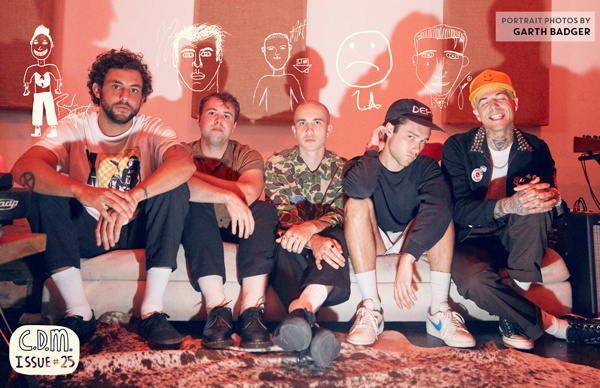
CDM: I think ‘Nervous’ is one of my favourite songs from ‘The Neighbourhood’. Jesse, you open with the line, “Maybe I shouldn't try to be perfect.” Why do you think perfection is something that is seen as something so desirable in society, when so little of society is actually perfect?
JESSE: Because you want what you can’t have, so to me, that statement kind of makes sense. Less people are perfect, so you strive to want it more, because it’s more of a rare thing. But also, my perspective is a guy who lives in Hollywood - it’s pretty tarnished out here, it’s pretty fucking ridiculous.
CDM: What was it like working with Benny Blanco on that song?
JESSE: I love Benny, he’s the best. Every time we work with him, it rocks.
BRANDON: He’s a good dude. Funny guy.
CDM: The strings in ‘Sadderdaze’ and ‘Too Serious’ are really cool. What made you guys want to have those on that song?
THE NEIGHBOURHOOD - JEREMY FREEDMAN: It was actually our manager. Our manager told us we should do strings, and then Lars [Stalfors], our producer, basically set me up with the string guy from Cold War Kids, which is another artist that he works with. We just wrote for an afternoon, and wrote a whole bunch of string parts.
JESSE: But with a quartet in there, right?
JEREMY: A duet. It was just me and him on the computer, but then they came in.
MIKEY: But Jeremy really took rein.
JEREMY: I had my real Brian Wilson moment.
CDM: I’m imagining you conducting two people, maybe next time there can be more than two.
BRANDON: I don’t know, more than two people is almost too much to manage. Two people is just enough. Imagine it with eight people.
JESSE: You’ve got do it in the Capitol Records Building then.
CDM: In ‘Void’ you share that, “My insecurities are my own worst enemy.” Do you think that insecurities can drive the worst parts of ourselves? Why do you think they can be so powerful?
JESSE: Totally. Kind of related back to the other thing about being perfect, they’re surface things - perfection, to a degree, is surface. It’s really hard for me to remember to feel from inside, because I let so much affect me. It’s a gift and a curse, feeling as sensitive as I do to the world, and to everything around me. I’m always tingly, you know what I mean? So things affect me really negatively or positively, and that’s kind of just the world.
CDM: Jeremy, you recently shared that you just finished reading Jordan B Peterson’s book '12 Rules For Life'. It looks so good.
JEREMY: It’s amazing. If you’re feeling a little depressed, or lonely, or anything, it’s just a good, straight line to mental health and getting your life right. It’s really sick.
CDM: Have you read any other good books recently?
JEREMY: I’m reading ‘The Catcher In The Rye’ right now. And Jordan Peterson’s other book, ‘Maps Of Meaning’, which is '12 Rules For Life', but much more in depth - it’s a study of the bible and the stories in the bible and how they relate to the human condition.
CDM: How does The Neighbourhood songwriting process work at the moment? Has it changed since you first began as a band?
JESSE: It’s funny, because just these last couple of weeks we’ve been jamming together in here, and we realised that since we started our band, we never really did that that much. A computer has always been a member of our band for so long, that’s how we create, like most people of our generation, but we go right into it, sequence the beat up, put in the guitar, and whatever fucking melody. It’s easy to jump the gun on that process, but we all grew up playing in bands, whether it be with each other, or without each other, but playing in live bands. Even though we were like 15 or whatever, we know how to do this, and we play every night live on-stage, but rarely have we ever just gotten in a room to just jam. I think we’re now starting to do that.
JEREMY: Definitely as a whole. It’ll always be me and Brandon after soundcheck, like, ‘We got an hour? Okay, we’re gonna jam for an hour.’
JESSE: Yeah, but even there, we’re on tour. You have the stuff there. From our own free will, we’ve never just been like, ‘Hey, what are you guys doing tomorrow? Let’s hang out and jam.’
BRANDON: It’s been pretty sick too.
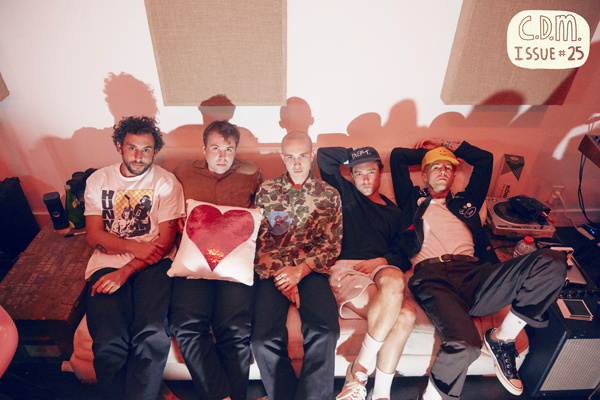
CDM: Do you normally have lyrical ideas that you bring in to work on?
JESSE: I’m kind of all over the place. I love having an idea, but again, I’m just sensitive to things - things affect me differently. I might have an idea for a dope thing, and then they start playing whatever they’re playing in the room, and my head is not focused on that idea because I start thinking about how I feel about that new thing.
BRANDON: A lot of the last record was the computer thing, a lot of us were making beats on our own and bringing them to people, and if someone liked it they’d work on it and turn it to Jesse, and Jesse did lyrics over that. That was probably most of the last record, a lot of computer-based ideas and showing them to everyone, and if someone liked one thing, then going in on that.
JESSE: Always collaborative.
BRANDON: Totally. Especially the last album. Now we’ve been jamming as a band which has been really sick.
CDM: In ‘Softcore’ you sing, “Sharing my heart / It's tearing me apart.” Why do you think sharing the deepest parts of ourselves with other people can be such a vulnerable part of life?
JESSE: We’re selfish, and you want the best shit for yourself too, and you don’t want to ever be thinking for a second, ‘Am I doing the right thing?’ Anytime that feeling happens for me, I’m just like, <draws breath> 'I don’t know,' you know what I mean? Everyday though, anything - all the best things. Like a great relationship, but maybe the relationship’s not good, so you’re asking yourself that and you’re like, ‘Well, is the rest of it worth it?’
CDM: Does the process from beginning to end, of making a song, take a long time from the very early stages to completion?
BRANDON: It varies from song to song I think. Some songs come out really quick, and then some songs just take forever to perfect. The best ones you vomit out.
JESSE: I agree. I was at some dinner recently, and this producer BloodPop was there - I had done one session with him - and we were talking at this dinner and he said something like, ‘Delete your ideas. If you start something and it doesn’t work out right there, fucking delete it and go away from it, and don’t just leave it there to maybe come back to.’ Because that is a thing I know everyone does. It’s natural though.
CDM: I feel like then it can pile up, and there’s so many ideas that you’re never going to be able to come back to them all.
BRANDON: There’s stacks of them, and you just go, ‘Oh, shit.’ I know I felt on certain songs on the last record, where there’s a producer or us, we just banged our heads over the wall, trying to fix it. And I was like, ‘Dude, we could be doing new shit, instead of trying to fix this one song.’ I think you’re right, if you get to a point where it’s not working instead of trying to bang your head on it, delete it, you could’ve made something way better by now.
JEREMY: I think when it gets to the point that it’s holding you back from doing stuff that’s going to be better--
BRANDON: It just bums you out, because then you stop liking the song, then when you finish it you might have resentment towards it.
JESSE: To go against that statement though, there are sometimes ideas you pull out from fucking three years ago and you could eat bars of it. That’s a good thing.
JEREMY: That’s almost like a completely different artist made that. From three years ago, it’s like discovering it. You’re not still that person.
JESSE: Absolutely. I always feel this way, that my oldest, most ignorant shit, I’ll always look back and be like, ‘Damn, I was on some shit back then, <laughs> I wasn’t ready, the world wasn’t ready, but maybe they’re ready now.' Honestly, that does happen.
CDM: Brandon, you released a song '43' under the name Bondi Blue with your friend Derek. When did you start that project?
BRANDON: I’ve known Derek for a really long time. Before I was in the band I was living with him in San Francisco with our friend Kevin [Patrick Sullivan], who’s in the band Field Medic - an artist that we’ve toured with. He just wanted to record some tracks and have a little studio set up at my house, and he’s mostly a folk artist, he uses a lot of acoustic guitars and live band stuff. He just wanted to try doing something straight from the computer, so we just threw autotune on his voice and completely threw him in a realm he’d never been in before. It was a song that he’d written acoustically, so we took the song and put it through Ableton and just tried to make it the opposite of what it used to be, and it turned into that track. But we worked on it for a while.
JESSE: Didn’t you have a couple?
BRANDON: We have a couple we’re sitting on, but that was the one that vomited out, and was like, ‘Oh, it’s done.’ Then we just tweaked it and sat on it for a while, and then he decided he wanted to put it out.
JESSE: Sometimes it’s just listening to something over and over and over for months, until you’re like, ‘I’m not sick of this one, so I guess it’s good enough.’
BRANDON: Especially with that song, I would listen to it with my headphones ten times in a row and was like, ‘All right, I’m not tired of it yet.’
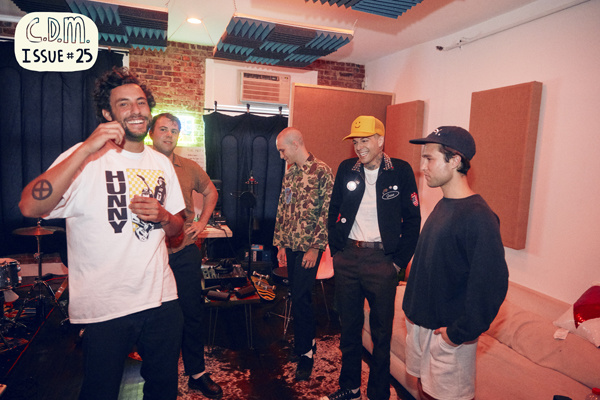
CDM: Mikey, I saw that you really loved ‘Eighth Grade’, which I’ve heard nothing but good things about! What other recent films have you loved?
MIKEY: Last night we had a movie night at my house, and we watched ‘Matchstick Men’ with Nicolas Cage.
ZACH: Nicolas Cage’s performance of a lifetime. He acted his ass off, it was crazy.
MIKEY: I don’t know what other movies I’ve seen in the theatre, I really want to see ‘BlacKkKlansman’, I really want to see ‘Sorry To Bother You’. But with ‘Eighth Grade’, everything Bo Burnham does I’m a big fan of, and it was a part of that. It really hit in a lot of ways, growing up in a suburb and feeling the feelings of an eighth grader again, the insecurities and anxiety that you go through at that age - it’s pretty gnarly. I’ve never seen it be put in a movie format before.
CDM: Zach, I tried to find out things online about you, but there’s so little information! So to get to know you better, we thought each of your bandmates could ask you a question…
MIKEY: He’s a mysterious guy!
JESSE: We already know everything. Do you have any pets?
ZACH: I have two cats.
BRANDON: He's a big cat guy. Him and Mikey share cats, technically.
MIKEY: Zach and I live together.
JESSE: But is it fair to say that you’re a pretty big cat guy, and you’ve had cats for quite a while?
ZACH: That is fair to say.
BRANDON: Zach just got a new guitar, a Jackson, he likes metal shredding.
MIKEY: I’ve got a good one. Which tour tattoo has the best story?
ZACH: I don’t know. Maybe getting the spider web in Russia, just because that was something I wanted to do, and it was super random because it was in Moscow, and it’s just weird to be in Russia in general.
BRANDON: Was it the first time you went?
ZACH: I don’t remember. I found the dude on Instagram, I thought he was dope, he did prison Russian tats. I went, and got out of a meet and greet.
BRANDON: The Adidas meet and greet? I still have shoes they gave us at that meet and greet, I wore them when I went golfing yesterday.
JESSE: Is that the first time you wore them?
BRANDON: No, I wear them. They’re sitting in my closet, they’re the only pair of athletic shoes I have, so whenever I have to move shit or go do something athletic, I wear those shoes. They’re holding up great.
MIKEY: I don’t know if I went to that.
BRANDON: We all went, it was an in-store Adidas mall signing. We were all there.
ZACH: I remember seeing photos of you guys. I was getting my tattoo.
JEREMY: Z, who’s your favourite fan?
ZACH: That’s easy, @nbhdfacts, for sure. I guess @nbhdfacts or The Neighbourhood Brasil. I got to give them a shout-out. But @nbhdfacts was there from the beginning.
BRANDON: And The Neighbourhood Brasil, they talked up a lot of game for us to come for years and years, and when we came, they showed up. They definitely stepped up to the plate with that. If we showed up to Brazil and it had been weak, or not that many people, I would’ve been like, ‘Wow, you guys talked up so much.’ But it was some of the biggest shit we’ve ever done.
CDM: I’m glad there were more than two people at the show.
BRANDON: There was a lot of people. We did Lollapalooza Brazil which was crazy, but even the sideshow we did there was the loudest and craziest show. I think they were louder than our instruments, and we were in a loud booming room, but somehow it amplified their voices louder than us which is crazy. It was sick.
CDM: Very importantly, why haven’t you been to New Zealand yet for a show?
BRANDON: We even have a New Zealand manager!
ZACH: We want to.
BRANDON: Sometimes our booking is out of our hands.
JESSE: If there’s enough of a demand, yeah.
BRANDON: You’re from New Zealand, do you think we can play there?
CDM: Lots of our readers always ask us if you’re coming. You guys played Australia, but never came to New Zealand.
JESSE: That was sick. I think we’re trying to go back there.
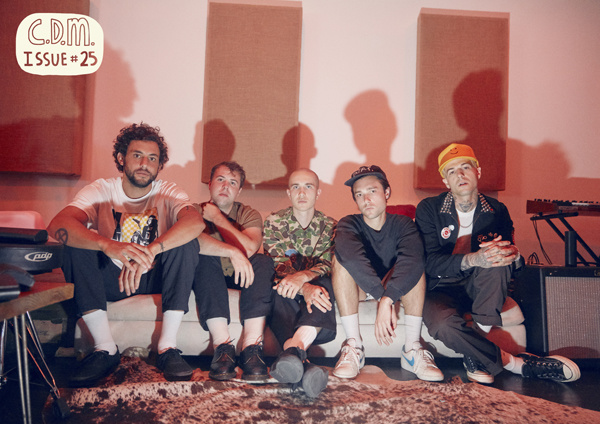
CDM: You guys are friends with BROCKHAMPTON, so we thought we’d ask, what is your favourite BROCKHAMPTON song and why?
BRANDON: Whatever the last one that they did with the video they put out [‘1999 WILDFIRE’]. It’s aggressive and super loud, it’s tight.
MIKEY: ‘GOLD’ for me, that’s when I really… I knew they were doing BROCKHAMPTON, but I didn’t really understand the whole entire thing. When they did that and I saw the video, I was like, ‘These guys are onto something.’
BRANDON: What’s the one Ryan Beatty is on?
CDM: ‘BLEACH’.
BRANDON: That’s a hit.
JESSE: I like, <sings ‘STAR’>, that’s on the first ’Saturation’.
CDM: Kevin’s tweet recently was super cute: “i wouldn’t be in this position without jesse rutherford. he believed in me so early on man he brought me out to the UK to play before i even put out american boyfriend damn shoutout the neighbourhood.” How did you first find out about Kevin Abstract?
JESSE: The internet. He put out a project called 'MTV1987' and the cover art was amazing, it was this cool leather jacket that was still in the Finder window on an Apple computer. I’ve always done design for our shit and for whatever, but I was on that buzz at that point in time and I hadn’t seen that ['MTV1987' cover] and I was like, ‘Oh fuck, that’s sick.' So really the art brought me in at first, ‘cuz HK [Henock Sileshi] does all their creative direction, and they just started coming out to shows, and they were coming out to shows for years before we even knew them.
ZACH: They would always come out to Houston.
JESSE: And Dallas one time too.
ZACH: I just remember one time I walked into the bus and it was Ian [Simpson], Ameer [Vann], Matt [Champion]--
JESSE: Jon [Nunes], who’s always with them. There’s so many of those motherfuckers, but they’re great.
BRANDON: When we were on tour it was mostly HK, Romil [Hemnani], Ian, and then their tour manager. I’ll see someone and I’ll be like, ‘I recognise that fool from when we toured together.’ There’s so many of them.
JESSE: It’s so hard to remember all their names, I’m still at this point, facial recognition.
ZACH: It was one of those things where after BROCKHAMPTON formed, I wasn’t sure if I met all of them. When we were in Montreal, I had never met Merlyn [Wood] before.
JESSE: You hadn’t met Merlyn, or Joba, or Dom [McLennon].
BRANDON: I just met Joba, he’s a really sweet dude.
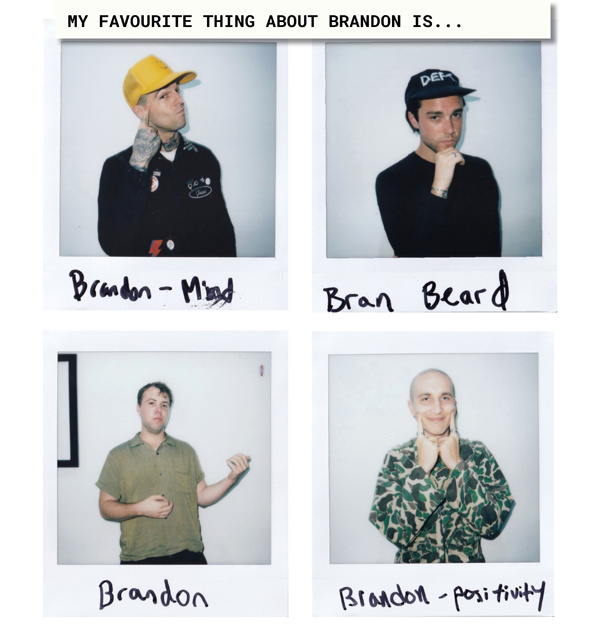
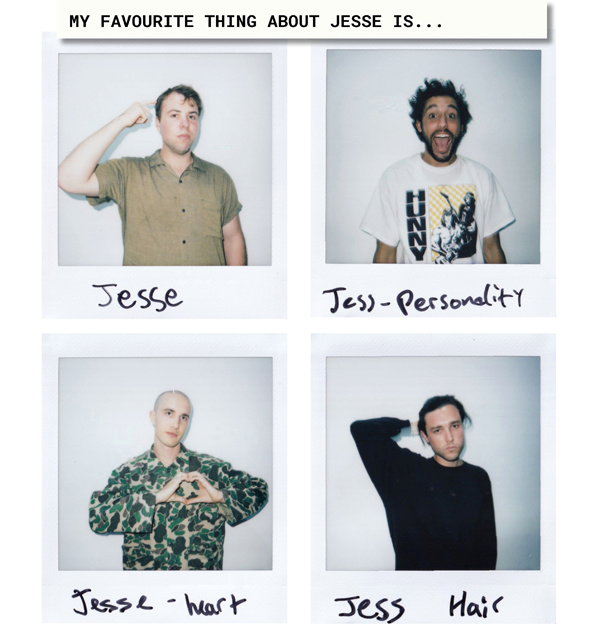
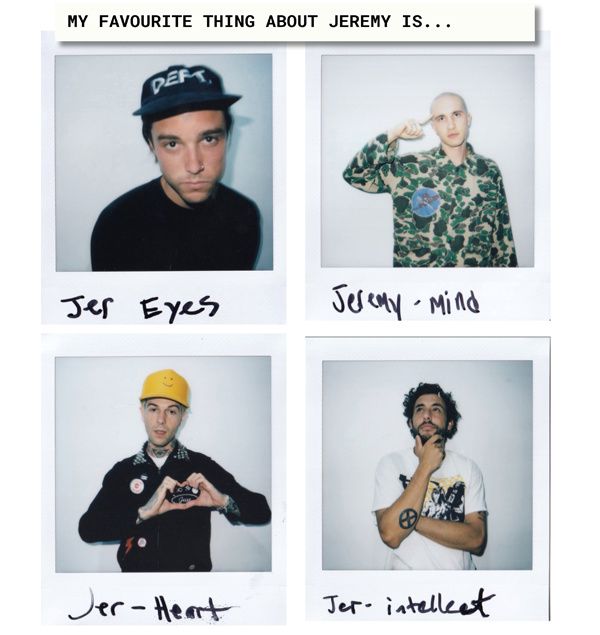
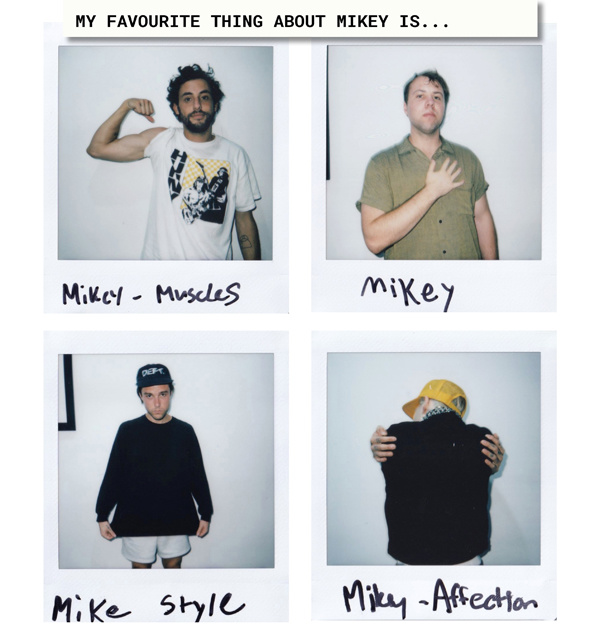
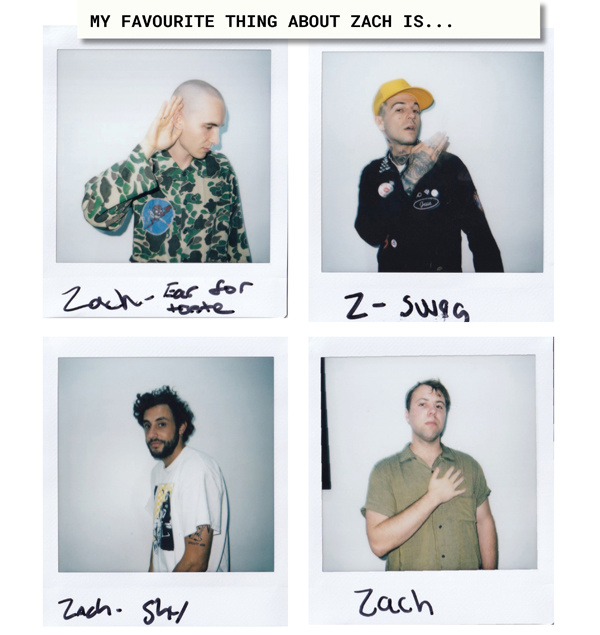
The Neighbourhood’s new EP ‘Every Changing’ is out now - click here to purchase, and listen to ‘Livin’ In A Dream’ below…

